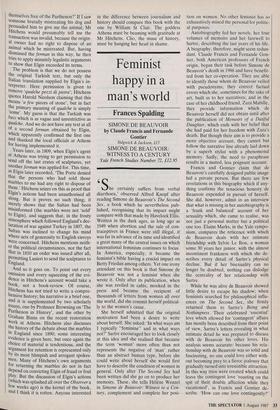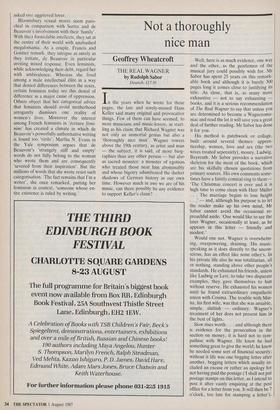Feminist happy in a man's world
Frances Spalding
SIMONE DE BEAUVOIR by Claude Francis and Fernande Gontier
Sidgwick & Jackson, fl5
SIMONE DE BEAUVOIR: WITNESS TO A CENTURY Yale French Studies Number 72, £12.95 She certainly suffers from verbal diarrhoea,' observed Alfred Knopf after reading Simone de Beauvoir's The Second Sex, a book which he nevertheless pub- lished, recognising that its impact might compare with that made by Havelock Ellis. Written in the dark ages, as long ago as 1949 when abortion and the sale of con- traceptives in France were still illegal, it was far in advance of its time and identified a great many of the central issues on which international feminism continues to focus. In America, especially, it became the feminist's bible having a crucial impact on Betty Friedan among others. Yet one irony attendant on this book is that Simone de Beauvoir was not a feminist when she wrote it. Only after its publication, when she was reviled in cafes, mocked in the press and became the recipient of thousands of letters from women all over the world, did she commit herself political- ly to the women's cause. She herself admitted that the original motivation had been a desire to write about herself. She asked: 'In what ways am I typically "feminine" and in what ways not?' Sartre encouraged her to look closely at this idea and she realised that because the term 'woman' more often than not represents the negative of 'man' rather than an abstract human type, before she could write about herself she would first have to describe the condition of women in general. Only after The Second Sex had been written did she go on to produce her memoirs. These, she tells Helene Wenzel in Simone de Beauvoir: Witness to a Cen- tury, complement and complete her posi-
tion on women. No other feminist has so exhaustively mined the personal for politic- al purposes.
Autobiography fed her novels, her four volumes of memoirs and her farewell to Sartre, describing the last years of his life. A biography, therefore, might seem redun- dant. Claude Francis and Fernande Gon- tier, both American professors of French origin, began their task before Simone de Beauvoir's death in 1986 and have benefit- ted from her co-operation. They are able to identify those whom de Beauvoir veiled with pseudonyms; they correct factual errors which she, sometimes for the sake of art, built in to her narratives; and in the case of her childhood friend, Zaza Mabille, they provide infqrmation which de Beauvoir herself did not obtain until after the publication of Memoirs of a Dutiful Daughter, which ends with her belief that she had paid for her freedom with Zaza's death. But though their aim is to provide a more objective account, they cannot but follow the narrative line already laid down by a superb stylist with a phenomenal memory. Sadly, the need to paraphrase results in a muted, less poignant account.
Francis and Gontier claim that de Beauvoir's carefully designed public image hid a private person. But there are few revelations in this biography which if any- thing confirms the tenacious honesty de Beauvoir expended in pursuit of herself. She did, however, admit in an interview that what is missing in her autobiography is a 'frank and balanced' account of her sexuality which, she came to realise, was not just a personal matter but a political one too. Elaine Marks, in the Yale sympo- sium, compares the reticence with which de Beauvoir deals with her intimate friendship with Sylvie Le Bon, a woman some 30 years her junior, with the almost incontinent frankness with which she de- scribes every detail of Sartre's physical decline. But if her bisexuality can no longer be doubted, nothing can dislodge the centrality of her relationship with Sartre.
While he was alive de Beauvoir showed little desire to escape his shadow; when feminists searched for philosophical influ- ences on The Second Sex, she firmly returned them to Sartre's Being and Nothingness. Their celebrated 'essential' love which allowed for 'contingent' affairs has mostly been described from their point of view, Sartre's letters revealing in what intimate detail he was prepared to discuss with de Beauvoir his other loves. His analysis seems accurate: because his rela- tionship with de Beauvoir was so solid and fascinating, no one could love either with- out becoming prey to a fierce jealousy that gradually turned into irresistible attraction. In this way trios were created which could leave the contingent love 'roasting on the spit of their double affection while they vacationed', as Francis and Gontier de- scribe. 'How can one love contingently?'
asked one aggrieved lover.
Bloomsbury sexual mores seem paro- chial in comparison with Sartre and de Beauvoir's involvement with their 'family'. With their formidable intellects, they sat at the centre of their world with unabashed megalomania. As a couple, Francis and Gontier remark, they intrigue as surely as they irritate, de Beauvoir in particular inviting mixed response. Even feminists, while acknowledging their debt, regard her with ambivalence. Whereas she lived among a male intellectual elite in a way that denied differences between the sexes, certain feminists today see this denial of difference as a major cause of oppression. Others object that her categorical advice that feminists should avoid motherhood arrogantly dismisses one reality of women's lives. Moreover the interest among French feminists in 'ecriture femi- nine' has created a climate in which de Beauvoir's powerfully authoritative writing is found too 'virile': Martha N. Evans in the Yale symposium argues that de Beauvoir's 'strangely stiff and empty' words do not fully belong to the woman who wrote them and are consequently 'severed from their inspiration'. But the millions of words that she wrote resist such categorisation. 'The fact remains that I'm a writer', she once remarked, putting her feminism in context, 'someone whose en- tire existence is ruled by writing.'



















































 Previous page
Previous page